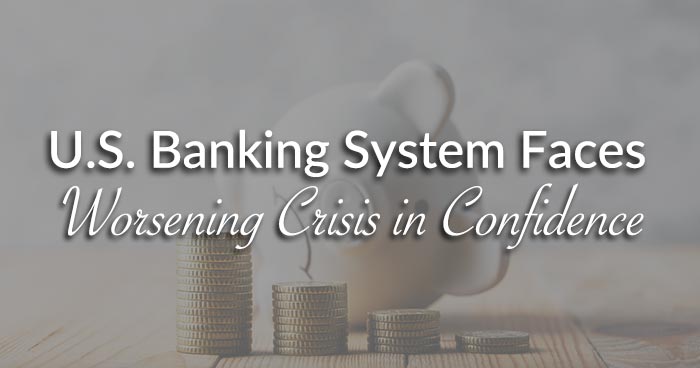The national news cycle has careened from one extraordinary and alarming story to the next. The brewing crisis in banks remains front and center. Americans are watching a demonstration on how to take a crisis in confidence and make it worse.
Many Americans have already lost trust in the FBI and DOJ. They don't trust Janet Yellen and other bureaucrats in Washington, and they don't trust Wall Street bankers.
The ongoing erosion of trust may be the most fundamental of all problems the country faces.

It is playing larger and larger roles in everything from elections to the administration of justice, to finance.
The current troubles in banking may be a signal that confidence has slid past the point where it can be recovered.
Officials called an emergency meeting following the collapse of Silicon Valley Bank and extended the FDIC guarantee to cover bank deposits larger than $250,000.
Americans were supposed to think all deposits were safe, but they were not comforted. Bank stock declines continued, as did the deposit flight from small banks to big banks.
Meanwhile, Janet Yellen admitted in testimony before Congress last week the program was more of a selective guarantee. A committee will first have to determine whether a bank's failure represents a risk of contagion before deposits are 100% guaranteed.
The implication is that the wealthy, well-connected, and woke account holders of Silicon Valley Bank are covered. But ranchers, farmers, and small businesses working with community banks or credit unions are not.
Last week, a group of large banks volunteered to deposit $30 billion in First Republic Bank. Investors were not reassured by this show of confidence.
Shares in the troubled bank fell another 30% on Friday and another 20% this morning.
The story is similar to Credit Suisse. The bank got an emergency loan of almost $54 billion from the Swiss National Bank. Bank executives said they were accepting the loan only out of an abundance of caution, and it wasn't needed. But once again investors called BS, and the stock price of the banking giant collapsed.
Last week, overnight borrowing at the Fed's discount window hit a new record, far surpassing the prior peak set at the height of the 2008 financial crisis. Many experts consider this to be one of the best indicators of how uneasy bankers themselves are about the state of their industry.
The efforts to backstop the banks and placate investors don't appear to be working. The people behind them must be surprised and frustrated. Throwing loads of money at the problem has worked reliably in the past.
Money can help banks weather a liquidity crunch and shore up the deposit base. It doesn't address a solvency problem that may exist, and it can't put a stop to the skepticism people now have toward bankers, politicians, and bureaucrats.
Investors are increasingly seeking safe-havens with zero counterparty risk such as physical precious metals. The gold price, nearing $2,000 per ounce, is on the verge of a historic breakout to all-time highs.

About the Author:
Clint Siegner is a Director at Money Metals Exchange, a precious metals dealer recently named "Best in the USA" by an independent global ratings group. A graduate of Linfield College in Oregon, Siegner puts his experience in business management along with his passion for personal liberty, limited government, and honest money into the development of Money Metals' brand and reach. This includes writing extensively on the bullion markets and their intersection with policy and world affairs.





